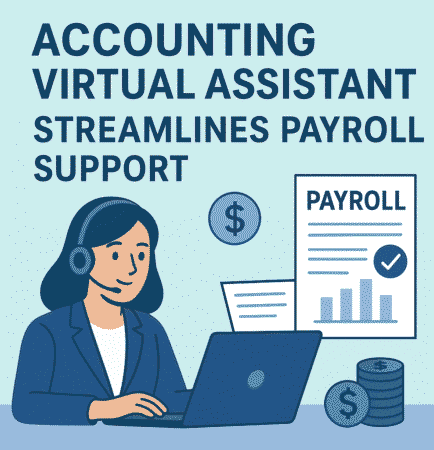

Virtual Assistant Services: A Game-Changer for Startups

Introduction
In the current fast-paced and competitive business environment, startups encounter numerous obstacles. From scarce resources to difficulties in expanding, the path of an entrepreneur is filled with challenges. A quickly growing solution is the adoption of virtual assistance services. These services allow startups to concentrate on their primary tasks by flexibly and efficiently managing business activities.
Virtual and AI assistants are transforming startups as they help improve operational efficiency and decrease costs. In this blog post, we will talk about how virtual assistance services can help startups, their benefits, and their influence on the future of business operations.


What Are Virtual Assistance Services?
Virtual assistance services consist of assigning different business tasks to individuals or AI-powered platforms that operate from a remote location. These services vary from administrative tasks and customer service to content creation and managing social media, as well as specialized functions like bookkeeping, digital marketing, and technical support.
There are two main types of virtual assistance:
1. Human Virtual Assistants: Professionals who work remotely and offer specialized skills or general administrative support.
2. AI Assistants: Technology-powered solutions, such as chatbots and AI-driven tools, automate repetitive tasks like data entry, scheduling, and customer queries.
Why Virtual Assistance Is Ideal for Startups
1. Cost-Effectiveness
One of the major obstacles for new businesses is controlling expenses. Employing permanent employees can come with high costs, particularly for positions that do not necessitate a 40-hour workweek. Virtual assistants provide an affordable option. Startups only pay for services as and when they require them. This removes the additional expenses of employing internal staff, including wages, perks, and workspace.
2. Access to Global Talent
Remote assistance allows startups to access talent from beyond just the local area. They can access a worldwide pool of expert professionals or artificial intelligence tools. This enables them to locate specialised knowledge tailored to their requirements without being restricted by location. The global availability of virtual assistance enables startups to easily and affordably access talented professionals like graphic designers, social media managers, and AI-based customer support.
3. Focus on Core Business Activities
Performing necessary administrative duties can consume a considerable portion of time. Virtual assistants assist founders and key team members in concentrating on essential business tasks by handling time-consuming duties such as email responses, meeting scheduling, and social media management. This aids in the efficient operation of the business without diverting the focus of the management from strategic growth initiatives.
4. Scalability and Flexibility
Startups frequently encounter varying workloads. Virtual assistants offer the ability to adjust the workload as required. For example, startups can provide additional assistance in handling the higher workload when facing peak seasons or launching new products. When operations become less active, they can promptly decrease the hours or staff without the complexities of standard employment agreements.
5. Around-the-Clock Operations
Remote support has the potential to help startups run continuously, especially when utilising virtual assistants across various time zones. This could provide a considerable benefit to the current worldwide economy. For instance, a virtual assistant working remotely can efficiently address a customer inquiry received outside of normal business hours, enhancing customer happiness and maintaining business operations.
Critical Virtual Assistance Services for Startups
1. Administrative Support
Administrative tasks are necessary for any business, but can drain time and resources. Virtual assistants can manage tasks such as:
- Answering emails
- Scheduling appointments
- Data entry
- Calendar management
This remote assistance type allows startup founders to focus on big-picture activities while handling day-to-day tasks efficiently.
2. Customer Support
Startups frequently require additional manpower to offer customer service 24/7. AI assistants, such as chatbots, can provide around-the-clock customer support. These tools, powered by artificial intelligence, can manage typical inquiries from customers, address basic problems, and escalate issues as needed.
3. Social Media Management
Establishing a digital presence is essential for new businesses. Social media management specialists on virtual assistants can generate content, plan out posts, and interact with followers. This service enables startups to have a strong presence on social media without using their resources.
4. Bookkeeping and Accounting
Handling finances is an essential part of operating a prosperous startup. Virtual assistants who know bookkeeping or accounting can handle expenses, handle invoices, and produce financial reports. This service assists new businesses in managing their finances without needing to hire a full-time accountant, thus saving on expenses.
5. Content Creation
In the digital realm, the most important thing is the content. Virtual assistants are capable of assisting startups by producing blog posts, articles, video content, or graphic designs. This enables startups to generate top-notch content regularly without requiring a content team to work full-time.
AI Assistants: The Future of Virtual Assistance
With the advancement of AI technology, AI assistants are becoming more complex and crucial for new businesses. AI-powered tools have the ability to automate repetitive tasks, which ultimately leads to saving time and resources. A few of the most well-liked AI helpers are:
- Chatbots, powered by AI, are capable of managing customer inquiries, completing orders, and providing around-the-clock support to ensure a smooth customer experience.
- AI scheduling tools like Calendly and Google AI automatically arrange meetings, provide reminders, and enhance time management.
- AI tools such as Copy.ai and Jasper provide content automation, enabling startups to produce blog posts, product descriptions, and other content without the need for a specific content writer.
- AI assistants provide new businesses with a cost-efficient method to improve operations, enhance productivity, and maintain a competitive edge.
How Startups Can Benefit from Remote Assistance
Remote support provides a level of flexibility and productivity that is not possible with traditional office arrangements. Below are a few important advantages of employing virtual assistants for new businesses:
1. Decreased expenses: No office space, equipment, or full-time salaries required. Startups can reap the advantages of a larger workforce without the accompanying expenses.
2. A variety of Skills: Virtual assistants frequently possess specific expertise, enabling startups to utilise specialised assistance in SEO, graphic design, or technical support without bringing on full-time employees.
3. Fast Registration: Virtual assistants and remote workers are generally used to working autonomously. This decreases the amount of time required for onboarding and training, enabling startups to quickly get started.
4. Work-Life Balance: Remote support enables startup founders and teams to achieve a more even work-life balance through delegating tasks, lowering burnout, and boosting productivity.
5. Increased productivity: By delegating mundane tasks to remote assistants, startups are able to concentrate on growth strategies, leading to a higher level of productivity.
Challenges of Using Virtual Assistance Services
While the advantages are notable, it is crucial to recognize a few of the obstacles that startups could encounter when utilizing virtual assistant services:
- Communication Challenges: Collaborating with remote assistants, particularly in varying time zones, may result in communication breakdowns at times. This can be lessened by utilising communication tools like Slack, Zoom, or Trello.
- Quality Control: It can be a difficult task to ensure that virtual assistants provide work of a high standard. To maintain quality, startups need to establish clear expectations, have frequent check-ins, and give feedback.
- Security Risks: Sharing sensitive business information with virtual assistants can lead to security concerns. Using secure communication channels and enforcing access control measures is crucial.
Best Practices for Startups Using Virtual Assistance
To get the most out of virtual assistance services, startups should follow these best practices:
- Effective Communication: Clearly outline responsibilities, requirements, and due dates. Utilise collaborative software to ensure everyone is informed and in sync.
- Routine Follow-Ups: Perform regular check-ins to confirm the progress of the work and ensure virtual assistants are adequately supported for success. Security Measures: Safeguard your data with secure communication tools and limit sharing of sensitive information to essential occasions.
- Progress Monitoring: Monitor the progress and performance of your virtual assistants by tracking their performance using tools like project management software.
- Develop connections: Even though virtual assistants work remotely, establishing a strong working relationship with them can result in improved collaboration and a more positive overall experience.
Conclusion
Virtual assistance services play a crucial role in the modern startup ecosystem, where agility and cost-efficiency are essential for survival and growth. Startups can utilize remote assistance to increase efficiency, lower expenses, and expand operations by utilizing human virtual assistants, AI assistants, or a combination of both.
Startups can prioritize innovation and growth by delegating non-core tasks to external resources, which makes virtual assistance both convenient and strategically beneficial. Accessing global talent and utilizing advanced AI tools has changed how startups function, preparing them for sustained success in an ever-growing digital landscape.
Virtual assistance services are more than just a trend—they’re the future of startup management. If you're a startup founder looking to streamline your operations, it’s time to consider embracing this revolutionary approach.


